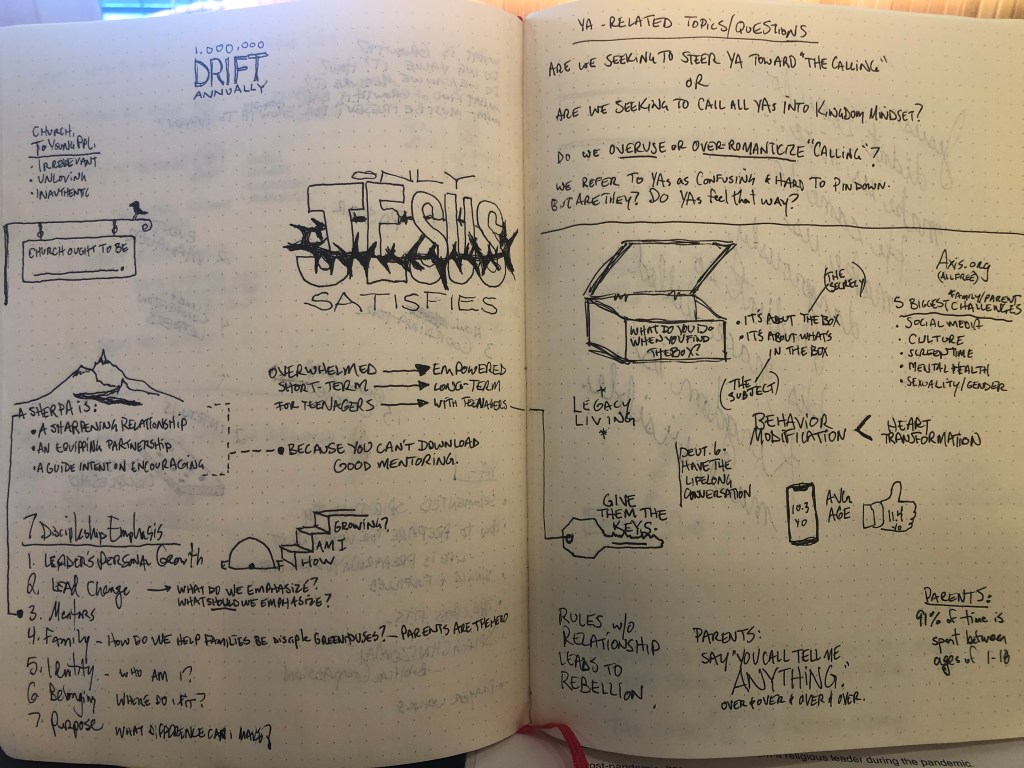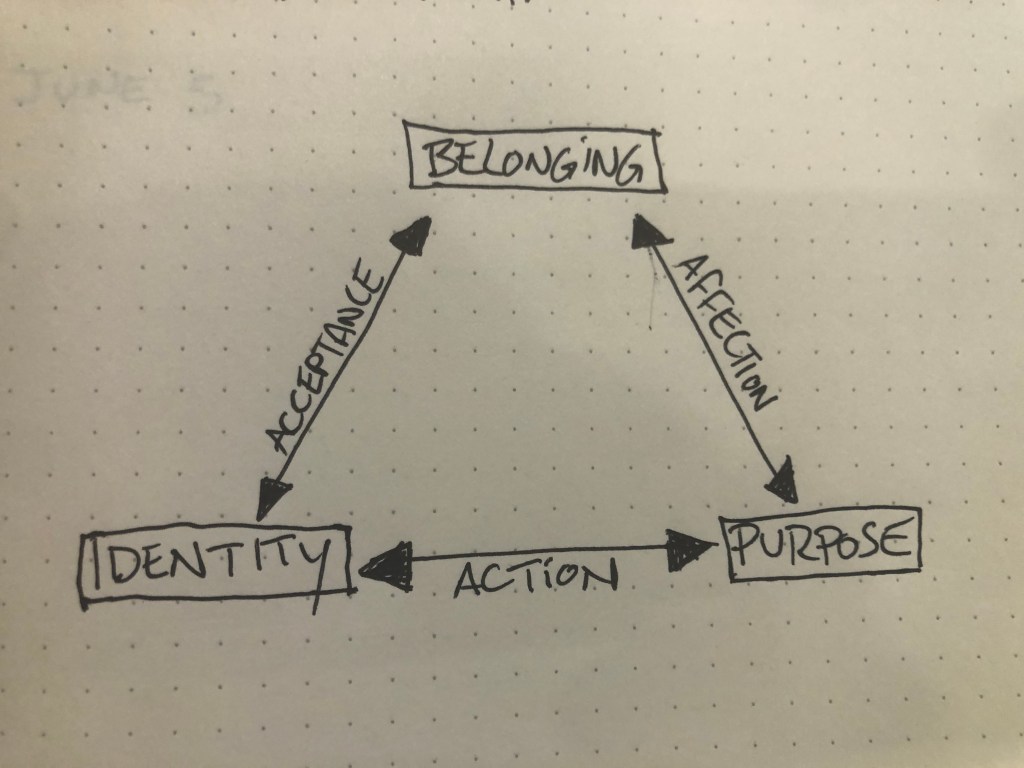“Hey Mark, take a photo of those mountains over there”, I said as I drove my rental car through Boise, Idaho. It wasn’t that I’d never seen mountains, it’s that I’d never seen THESE mountains before. Mark (who had come along as my self-appointed sidekick) obliged and here’s that photo…

I’ve been here in Nampa, ID since Sunday for an annual event called NYILC2024. That’s “Nazarene Youth International Leadership Conference”. I’m a part of a worldwide family of people whose lives are intent and focused on serving, ministering to, loving, investing in, and seeing God’s Spirit captivate, shape, and ignite the young generation of students and young adults. I’m sitting in the hotel lobby the morning after this event has ended and as is my custom, writing about what I’ve experienced will help me process and solidify some things I’ve heard. If it’s encouraging or thought-provoking to you, so much the better.
I’ll start by saying that I came into this event with a desire to connect with those specifically ministering to and among young adults. In my ministry context, we define that as 18-30 year olds. In January of 2022, “Pastor to Young Adults” was added to my role of “Pastor to Students”, a role I’ve held at Southside Church in the Richmond area of Virginia since 2004. So if you’re in middle school up to age 30ish, the lion’s share of my thoughts, wonderings, ideas, plans, and everyday breathing is revolving around you, where you are, what you’re doing, what you’re struggling with, how you’re growing, what your fears are, and how I can best encourage, support, and offer help to you, whoever you are and wherever you are.
The last two days have been cram-packed full of presentations, interactions, and conversations. If you know me, you know I’m a processor, and one of the things that helps me listen and think through my thoughts as I listen to a speaker speaking for example (but also in smaller meetings) is to doodle as I take my notes. I’m far more of a visually engaged learner so sketches and imagery are how my brain operates. I thought it might be interesting to show you some of those sketches/notes/doodles and then we can unpack them.
*I’ll also confess to you that its happens A LOT that I’m not sketching or notetaking what the speaker is saying; it often happens that a simple word they say sends my brain through a cerebral side door and I’m off thinking things that are maybe first, second, or third cousin to what the speaker is actually saying. Anyone else do that? I do it when listening to sermons, podcasts, and audiobooks too. I’ll also tell you that I hope to (need to, really) finish writing this blog in one sitting. If I don’t, my blog brain will struggle to pick it back up later. At this moment I’ve got a little less than 2 hours to finish before we have to head to the airport to fly home. So…you know….grab a drink and a seat. Or bookmark this page and come back to it, taking it in chunks. I won’t be offended.
One of the first things I experienced on day one of the conference was the chapel gathering on the campus of Northwest Nazarene University, the host of this event. We joined with NNU students in their regularly scheduled worship and teaching from the Word. This chapel’s speaker was Shane Lima, the newly appointed chaplain at another of our Nazarene schools, Eastern Nazarene College in Quincy, Massachusetts. Shane (who was also attending the conference) shared a powerful message on Matthew 10:5-7 and 11-20. One of the main things that struck me in that message was his statement, “Jesus’ presence does not guarantee the results you want.” If you’ve walked with Jesus in faith for more than 30 minutes, you’ve likely learned this through your own experience but it was helpful to hear it stated so plainly and succinctly. We all have areas in our lives that we wish were different than they are, but it’s in those moments that many of us start to wonder (let’s be honest, we doubt) whether/if God is still caring, still good, still present. But Jesus invites us to follow Him. I find in my own life that inch by inch I try and turn that invitation around to me telling Jesus, “Hey Jesus, follow ME.”….“Oh, and while you’re at it… pay the bills, give me favor in my workplace in the form of promotions that equal more money so I can buy more stuff, shut the mouth of my neighbor who’s always complaining to me about something, help that person at that intersection who’s holding that cardboard so they won’t stand there anymore because they make me uncomfortable, fix my spouse so they’ll see things my way, open up doors of opportunity for me so I can enjoy life more, don’t forget those bills, and heal every person I know who has an illness because why wouldn’t you?” I’m not sure if anyone else is inviting Jesus to follow them instead of starting each day with a surrendered mind and heart so that I can follow Him, but that’s my struggle.
After chapel, we came back to the main session area and settled in for some information and learning. One of the presenters shared a statistic about teenagers as an encouragement to us as leaders who impact young people. But I couldn’t help but fixate on a stat they didn’t focus on or even point out. Take a look:
The emphasis was placed on that 56% in the middle there. 56% of teenagers agree with the statement “My generation can make a positive impact on the world.” So naturally the win here is that most teens still have a positive view of their ability to affect change. That’s great. But do you see what I saw? A 17-18 year-old senior in high school might think they can make a positive impact on the world but look at where we can reasonably estimate a 20-year-old young adult is in their view. What happens in a matter of sometimes a year or two that causes that percentage to drop nearly TWENTY percentage points?!? What is going on with young adults that there is such a shift away from a positive perspective about their ability to impact the world? So many questions flood my mind about that. If you’re in the age range of 18-30, would you reach out to me and share your thoughts with me on this? My email is jvarner@southsidechurchva.org or if you’d rather stay anonymous, text (804) 464-7077. If you text that number, I won’t know who you are unless you tell me; it’s completely (and intentionally) anonymous. That moment in that presentation when I saw those numbers really triggered a lot of thoughts I want to digest and process. (And I’m not a dude who’s a sucker for stats, either. Nor do I think “the sky is falling” the way it seems most stats are designed to make you feel.)
Okay, on to something else I jotted down. The presenter was telling us that according to studies, young people describe church as “irrelevant, unloving, and inauthentic.” I’m going to be gut-level honest here. My first thought was “Well, if they came to MY church or the ministry that I lead, they wouldn’t think that.” But you know what? I can’t remember the last time I even asked the teenagers I interact with week in and week out how they view our church family/spiritual community. Would they say the same thing? Man, I hope not. But I can’t dismiss this just because I want to disagree with it. Reality doesn’t work like that. So I think maybe I’ll ask as many young people as I can to give me the adjectives they’d apply to church. And/or maybe fill in that blank I’ve doodled on that sign hanging over there.
Church. You know who are you. I’m talking to you, Church. If you claim to love Jesus then LOVE JESUS with all you are, all your priorities, all your affection, in all the areas of your life. Be transparent, be vulnerable, be grace-filled, be connective, be authentic, be willing to embrace others in the name of Jesus. If you don’t then the young generation will continue to find the Church irrelevant, unloving, and inauthentic. Ask yourself this question: What am I doing to connect with younger people in my local church and community? It’s often only a matter of smiling, greeting them warmly, offering a hug and a listening ear, inviting them into conversation, and being real. Today’s young generation doesn’t need perfection. They need people who are willing to link arms with them as we walk imperfectly with Jesus. So if you’re clocking in on Sunday mornings and clocking out at noon on Sunday then please have a conversation with God about what’s causing you to do that. It’s not hyperbole to say that a generation hangs in the balance.
As I thought my rabbit trail thoughts in that conference seating, I thought about that bucket of Hot Wheels and Matchbox cars I loved to play with as a kid. I had some tracks I’d attach together and somehow got my hands on one of those special pieces of track that has these dense foam wheels that spin and propel the racecar forward and further down the track. That racecar can go on perpetually if there are enough of those special pieces of track for that car to reach. What if we as adults in the lives of young people committed to propel them forward in their faith, in their relationships, in their interests, in their questions, and in their search for the purpose of their lives? Based on current research, not only are most faith communities NOT propelling young people, but they’re actually repelling young people. We’ve got to turn this around, but this isn’t the job of Young Adult pastors like me. This has to be a Church culture thing. There has to be a shift away from holding on to what was for our own comfort’s sake and a willingness to venture into what could be for the sake of the souls of this young generation.
Related to this is the keychain concept. The Church has for a long time treated 13-18-year-olds as “wait your turn” not-quite-ready-yet addendums. Many churches even use the term “Next Gen Pastor” which I feel is an inadvertent slight to the generation we’re seeking to serve. Isn’t “next” essentially “not yet”? No, we’ve got to enfold young people into the Kingdom life of the local church on every level right now. One church I learned about dismissed its adult prayer team that prays with people at the altar during response time of their church services and replaced it with a prayer team made up of teenagers. Nice thought, but that’s not what I think should happen. We need young people linking arms and being valued by the Church. Students should serve in any area where adults are being trusted, with a caring and supportive partnership where there truly is a discipling that happens. If we treat students like “wait your turn” then we shouldn’t be surprised when they view themselves as not good enough and never ready to offer who they are and all they can to the Kingdom. To put it bluntly, they get tired of waiting and simply leave. Because quite honestly, that’s the message they’ve received from us.
I’ll say here as loudly as I can that I’m proud to be a part of a church that places a heavy emphasis on ministering with (not just to) young people. I am living, and breathing proof that this local church I serve prioritizes inclusivity of the young generation. The focus here is to disciple lifelong followers of Jesus, not just weekly church attenders. I’m not interested in giving young people more things for their calendars, or simply a place to be. It’s far more about heart transformation. That’s why starting on Easter Sunday and each Sunday thereafter, students will be engaged in worship shoulder-to-shoulder with the adults of our church. Our students need to see what 70-year-old worship and surrender looks like and our 70-year-olds need to see what 15-year-old surrender and worship looks like.
I’m continually giving the keys to young people. I’m disinterested in building a Jerry-centered kingdom where all things hinge on me as a pastor. While I’m away in Idaho, our Young Adult Community group carried on without me, as does our student Grow Groups gathering tonight. If this ministry is based on what Jerry does, we’re screwed. That’s why we must continually hand the keys over to young(er) people.
Kara Powell, Executive Director of Fuller Youth Institute was with us for this conference. Kara and her team are a tour de force in the area of researching youth culture in America and resourcing leaders with the tools they need to effectively impact this young generation. The work Fuller Youth Institute (FYI) does can’t be overstated. If you have a heart for young people, you likely already know about Fuller and Kara Powell and it was great to hear from her this week.
Kara and the Fuller team have written so many books and material centered around the three areas that young people grapple with; the 3 questions that need to be answered if they’re to have a healthy understanding of themselves and their place in this world. The 3 words are: Identity, Belonging, & Purpose. And the 3 corresponding questions are: “Who am I?”, “Where do I fit?”, and “What difference can I make?” Truth be told, there are plenty of adults that still have a slow-simmering of these questions in their minds because they’ve never addressed them intentionally in their younger years.
In true rabbit-trail fashion, I added to these three words three other words that I felt were reflective of the process that young people go through in terms of finding their identity, their place of belonging, and their purpose. Those words are: Acceptance, Affection, and Action.
Acceptance: I’ve said it countless times to parents of young people: Whoever offers your son/daughter the most acceptance and affirmation will win their affection, so make sure that’s you! When a teenager feels acceptance, this speaks directly to their identity and their sense of belonging. I’ve seen it and so have you–a young person goes through a metamorphosis and begins to dress and speak like the group of friends who have shown them acceptance.
Affection: Hey Dads, can we talk? Studies show that on average us dads stop showing affection to our kids (especially our daughters) around the age of them reaching 13 or so. This has proven to be disastrous. Parents, please say “I love you” until they roll their eyes. Say “You can talk to me about anything” as often as you possibly can. Don’t stop saying it. Say it out of the blue, say it in the car, say it over their shoulder while they’re doing homework, say it when you notice them in a sullen mood. Say it when they’re elated over some triumph they’ve experienced. Say it over and over.
Action: This young generation is filled with activators. Its human nature to respond to causes, but in our age there is a continual torrent of causes to act on. Action is hardwired into the DNA of this young generation. When we present to them a theoretical faith that has no clear outplay leading them to outcomes and greater spiritual intimacy, they quickly lose interest and rightfully so. Ask the question “What does this truth compel me to do?” anytime you read God’s Word, or share wisdom with a young person. They’re built to act. We as the Church sometimes focus more on information than transformation. Of course, information is essential. But if we’re simply feeding information and not leading transformation, we’ll lose them.
This next bit of information was sobering but maybe comes (for me) a bit too late. My wife and I have 4 kids, and the youngest one is 20 years old. So if you’re a parent of a 0-18 year old, just look at that number: 91%. 91% of the time you’ll spend with that human will happen before they turn 18. The other 9-10% will be spread out over the next 40 years.
Still think you can put off intentionally doing the things you really want go but somehow can’t get around to? Let me suggest a few things:
- Tell them you’re here for them no matter what.
- Tell them you’re proud of them without attaching it to some task they accomplished.
- Tell them you can’t believe God is letting you be their parent.
- Tell them you are the #1 supporter of their dreams, without qualifying your like/dislike of those dreams. Share your story with them about how God has directed your steps.
- Spend the time you really need to spend with them in conversation, rather than thinking they wouldn’t want that (Statistics consistently show that parents are far and away the #1 influence in their kids’ lives).
- Let your faith be visible for them; not to be showy but to show them that its real in your life.
Let me wrap this up with one final truth that stuck out to me as NYILC came to a close. Shane Lima once again shared from God’s Word and was preaching from and around Jeremiah 29:11. It’s a well-known verse that many people claim for themselves, especially in times of uncertainty or when they’re thinking about the future. Many young people who hear this verse use it as a remedy to what might otherwise be a tailspin of anxiety when they think about all the question marks in their life.
This one hits closer to home because this very verse was painted on the bedroom wall of our daughters’ bedroom. Every day, and as they slept this verse literally hung over them:
“For I know the plans I have for you, declares the Lord, plans to prosper you and not to harm you, plans to give you hope and a future.”
When we read, study, teach, or preach God’s Word, context is king. I’d suggest that you read for yourself what the context of this verse is. Read the entire chapter. Today’s parents and young people aren’t wrong to claim it or lean on it in times of uncertainty, but there’s a bigger picture here. For now, I’d like to point out the “I” in this verse. I was struck by the fact that it’s God who knows and He is “I” that matters. Often times I get wrapped up in deciphering the plans or getting wrapped up in the details of what’s now and what’s next. That’s not necessarily wrong until I place knowing details on the same level as knowing God. Flying home to Richmond from Boise demands that I literally place my life and all my trust in a pilot that I’ll never meet and don’t know. What I do know is that he’s qualified and capable of directing that plane across this enormous country and landing it on a thin strip of asphalt, right on schedule. If I can place that level of trust in a pilot I’ve never met, I can surely place my life in the hands of a God that I have met, and do know.
All in all, NYILC2024 was a time of connecting, refreshing, and reminding. I love the opportunity to connect with others who are living life loving young people like I am. I love the refreshment that God’s Spirit gave me through those couple of days away. I wouldn’t call the conference restful, but it was certainly refreshing. The reminders that God desired me to hear came in the form of one-on-one conversations, collective worship, receiving helpful information, and giving me ample opportunities to find a tremendous joy in seeking to encourage those around me.
*As a fun surprise, a blog post I wrote for NYI Connect went live during NYILC2024. If you’d like to read that blog post, you can find it here.
Here’s a shot of one spread of my notebook that has some other stuff on it that I didn’t write about here…




















